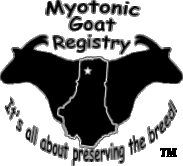Welcome to Nine Acres Farm
|
|
Nine Acres Farm is located west of Des Moines, Iowa, just outside the town of Adel. We strive to breed goats that meet the Myotonic Goat Registry breed description and maintain the qualities we value, including high quality muscle, docile personalities, excellent mothering instincts, and steady growth. |
Contact Information
Nikki Thummel
515-971-2582
[email protected]
Or follow Nine Acres Farm on Facebook by clicking here
Nikki Thummel
515-971-2582
[email protected]
Or follow Nine Acres Farm on Facebook by clicking here
For the health of my herd, all goats over 1 year are tested annually for CL, CAE, and Johne's.
A copy of my test results are always provided to buyers and are available upon request.
Please make testing and buying from tested herds a priority!
A copy of my test results are always provided to buyers and are available upon request.
Please make testing and buying from tested herds a priority!
Nine Acres Farm is a proud member of the Myotonic Goat Registry
More information on our wonderful breed can be found at the link below:
More information on our wonderful breed can be found at the link below:

